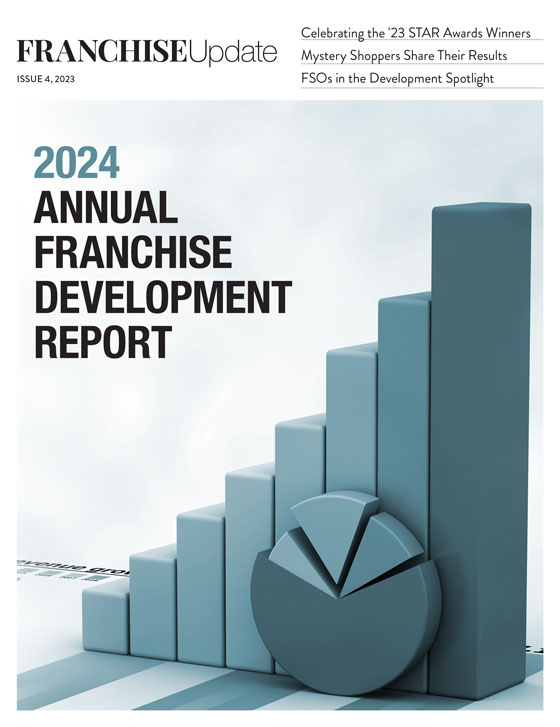Contrast, Compare, Compete: Performance benchmarking guides you to the next level

Taking time for introspection is always a valuable endeavor. This principle holds true for personal growth and for the success of your franchise. We need context that comes from assessing our progress and our relationships with others. If we are to properly prepare for 2024, we need to understand how we compare with our competitors.
Performance benchmarking
Performance benchmarking for franchises involves a methodical, objective process of evaluating performance in relation to peers and best-in-class systems. This evaluation encompasses system growth, unit success, turnover, financial metrics of both franchisor and franchisees, franchise offering terms, support programs, franchisee satisfaction, and marketing practices. The aim is to recognize the strengths and weaknesses of your system in comparison to competitors and establish targets for advancement. Common metrics include
- System growth over time, including new units added annually, units transferred, renewals, etc.
- System geography, encompassing projected growth, available territories, and competitive landscape
- Franchising programs, such as multi-unit agreements and area development, and the use of incentives
- Fee structures, covering initial fees, royalties, startup marketing, and other requirements
- Initial investment considerations, including unit and territory size definitions, and real estate arrangements
- Unit financials, such as AUVs and EBITDA
- Recruitment strategies and marketing messaging, involving the use of brokers, area representatives, social media, and opportunity sites
- Support programs and staffing
- Franchisee profiles, distinguishing between multi-unit owners and single-unit operators as well as evaluating franchisee satisfaction levels
Getting a view of all this information about yourself and where you stand against your peers is invaluable.
Who are your peers?
Identifying the right peers is crucial to the usefulness of the process. Be sure to consider the competitive landscape separately for your customers, prospects, and employees.
If you are a small brand with fewer than 100 units or operating for only a few years, does it make sense to compare yourself to well-recognized national brands when looking at customers? You might be able to learn from them, but their operations probably are too different from yours at this point to help much. What about ownership? Do independent brands operate the same way as brands that are part of a platform or that have PE investors behind them?
Consider who is competing for your franchisees’ customers. From your system-wide perspective, you may say that these other industry brands are direct competitors, but if you ask your franchisees, they may be thinking locally. Who is located near them that is competing for the same dollar?
Think about franchisee recruitment. Which brands are competing with you for prospects? Do initial investment and the financial model determine your competition? If a prospect doesn’t join you, do they go to another brand in your industry or look at other businesses? Maybe what you want to compare is your offering terms, sales process, and messaging. The same approach applies to employee recruitment.
Take both a wide-angle and a narrow view at the same time. Understand if your entire industry is growing or struggling but also compare new unit sales to brands that are competing for the same franchisee prospects. Further, be aware of new brands in your sector. They could have an innovative or more operationally efficient offering with great appeal to your prospects.
The benefits
Why do all this work? There are enormous benefits to doing benchmarking.
Improved decision-making. Benchmarking provides data-driven insights that inform decision-making. It allows businesses to make informed choices based on industry best practices and competitor performance.
Identifying performance gaps. By comparing their performance to that of competitors, franchises can identify gaps that may highlight areas that require immediate attention and improvement.
Setting realistic goals. Why do your new year’s resolutions fail? Sometimes, it’s because we are too ambitious. Benchmarking helps you set realistic, achievable goals. It provides an understanding of what others in your industry are achieving, allowing companies to set targets that are both challenging and attainable.
Enhanced operational efficiency. Benchmarking encourages the adoption of best practices, leading to increased operational efficiency. You can learn how others are addressing similar problems.
Performance benchmarking stands as a powerful tool for evaluating and improving your franchise's performance in today's dynamic markets. When wielded effectively, it offers insights that drive informed decision-making, boost operational efficiency, and foster a customer-centric approach. By striving to learn from the best and continuously enhance your performance, you position your franchise for long-term success in a competitive world.
As COO of FRANdata, Paul Wilbur is instrumental in building the research and consulting framework at FRANdata. Paul plays an integral role in the strategic development of FRANdata’s suite of franchise solutions. As a close to 20-year veteran at the company, he is the franchise business model expert and plays a key role in fostering the strategic advisory relationships to some of FRANdata’s biggest clients.
Share this Feature
Recommended Reading:
FRANCHISE TOPICS
- Multi-Unit Franchising
- Get Started in Franchising
- Franchise Growth
- Franchise Operations
- Open New Units
- Franchise Leadership
- Franchise Marketing
- Technology
- Franchise Law
- Franchise Awards
- Franchise Rankings
- Franchise Trends
- Franchise Development
- Featured Franchise Stories
FEATURED IN

Franchise Update Magazine: Issue 4, 2023








 The franchise listed above are not related to or endorsed by Franchise Update or Franchise Update Media Group. We are not engaged in, supporting, or endorsing any specific franchise, business opportunity, company or individual. No statement in this site is to be construed as a recommendation. We encourage prospective franchise buyers to perform extensive due diligence when considering a franchise opportunity.
The franchise listed above are not related to or endorsed by Franchise Update or Franchise Update Media Group. We are not engaged in, supporting, or endorsing any specific franchise, business opportunity, company or individual. No statement in this site is to be construed as a recommendation. We encourage prospective franchise buyers to perform extensive due diligence when considering a franchise opportunity.